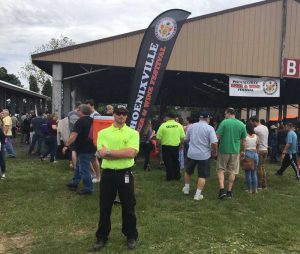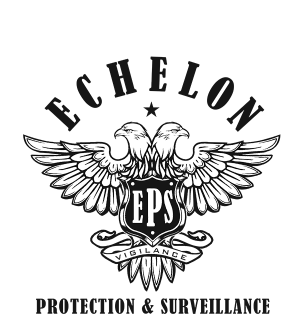By: Stuart J. Visnov, CEO, Echelon Protection & Surveillance
Word count: 651

BOUNCERS
A bouncer is often hired directly by a bar, nightclub or other entertainment venue owners to maintain order. Bouncers are useful where clientele or alcohol consumption may result in unwanted or illegal activity that creates an unsafe environment for patrons and staff. A bouncer’s duties may include:
- Checking for ID to ensure patrons are of legal drinking age
- Refusing entry to intoxicated patrons
- Requesting that a patron leave when they’re drunk or disorderly
- Knowing when to call law enforcement
- Protecting patrons from harm
- Using appropriate force to defend themselves
By law, a bouncer can physically engage or restrain a person as long as it’s in self-defense or in service of the protection of other patrons or staff. When physical force is initiated by a patron, the bouncer has the right defend himself with an equal amount of force. However, bouncers are taken to court so regularly, it’s considered the single most preventable loss within the tavern industry. So, if you’re the owner or manager, you’re still likely to be sued for assault and associated damages such as medical bills, pain and suffering and lawyer’s fees.
As a result, many states have passed laws requiring that bouncers be trained, licensed, and vetted, including criminal background checks. For instance, Philadelphia instituted a City Ordinance, which requires that bouncers must be registered and receive proper training. The law also mandates that people with certain past criminal convictions may not be hired as bouncers, all under very specific regulations.
SECURITY GUARDS
Security Guards are usually employees of a security company, rather than hired directly by venue or bar owners. This benefits the proprietor because the guard is additionally licensed, bonded and insured under the security company. Additionally, a security guard is trained and certified according to State law to further protect against liability. Echelon is licensed in PA, NJ, MD and DE and we comply with each States unique security guard standards.
Pennsylvania distinguishes between individuals who own security guard firms and those employed by them. The Private Detective Act of 1953 sets requirements for watch, patrol, and guard businesses while mandating minimum standards for hiring guards.
New Jersey security officers must meet requirements under the Security Officer Registration Act (SORA). Security company owners must be licensed, but employees and subcontractors are registered as security officers. NJ guards must meet specific vetting and training requirements. Security officers employed by businesses rather than security companies are subject to a different set of rules.
Maryland security guards are under the jurisdiction of the Maryland State Police Licensing Division. The Division recognizes multiple security officer job roles including those for corporations.
Delaware’s security guards are licensed by the Delaware Department of Safety and Homeland Security. To become a security guard, they must fulfill training, pass a proficiency test, and submit to a thorough background check. In addition, they must be eighteen to work as an unarmed guard, and 21 to work as an armed guard. Private security licenses are not offered to law enforcement employees.
Security Guards (unarmed and armed) are best used as a highly visible deterrent to prevent unwanted or illegal activity before it starts or grows out of control. They can perform all the same duties as a Bouncer, plus additional tasks to lessen liability and keep everyone safe. For example:
- Access control and ID verification
- Bag checks for weapons and substances
- Metal detection services by wand or magnetometer
- TIPS alcohol awareness training
- MOAB management of aggressive behavior training
- RAMP certified via the LCB
- Digital security guard reporting and documentation
- GPS sign-in / sign-out jobsite verification
- Emergency, hazard and crisis training, protocols and drills
- Active shooter protocols
- VIP escorts and transportation
- Comprehensive threat assessment reports
- Coordination with local law enforcement
Establishments should consider additional training such as TIPS, MOAB and RAMP for both security guards and bouncers to address everyday challenges such as protocols for dealing with underage patrons, reducing alcohol service liability through awareness, understanding when the use of physical force is permitted and using verbal communication to deescalate aggressive behavior.
TIPS is a skills-based, online alcohol training and certification program that is designed to prevent intoxication, underage drinking, and drunk driving by enhancing awareness and skills of servers, sellers and consumers of alcohol.
MOAB training presents principles, techniques, and skills for recognizing, reducing, and management of aggressive behavior both in and out of the workplace.
RAMP certification is a set of training and resources available to licensees and their employees. In order to become certified, businesses must complete a five step program, which includes: Manager training, seller or server training, employee orientation, posted signage, and affidavit request. The program provides certification for two years.
A quick story…
A few years ago, we had an inebriated patron start a public fight at a posh holiday event. When our security guards stepped-in to break up the fight and protect other guests, the belligerent patron punched one of our guards. The guard responded with appropriate force, restored order to the small crowd, restrained the drunk patron, contacted the police, and then escorted the troublemaker outside to wait for the police. When local authorities arrived soon after, the patron tried to attack them as well. Guess what? The event venue, local authorities, caterer responsible for the bar, and our security company were all named in the subsequent lawsuit. We had clear surveillance video and written documentation, our guard certifications were in order, our training manual was current, and we’re licensed, bonded and insured – several months later, we won the lawsuit.
In my view, Bouncers and Security Guards can both be effective depending on your specific goals. However, it’s a real benefit for clients to have the assets of a full service security company at their disposal because it eliminates much of the time and effort associated with hiring, training and managing your own security staff. In addition, you can add seasonal security staff, increase security during a national threat, or replace a guard who’s not the right fit with just a phone call.


